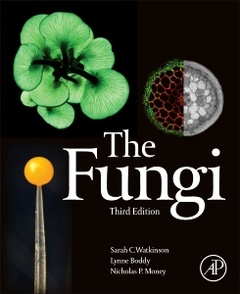Description
The Fungi (3rd Ed.)
Authors: Watkinson Sarah C., Boddy Lynne, Money Nicholas
Language: English
Keywords
81.20 €
In Print (Delivery period: 14 days).
Add to cartSupport: Print on demand
Description
/li>Contents
/li>Readership
/li>Comment
/li>
The Fungi, Third Edition, offers a comprehensive and thoroughly integrated treatment of the biology of the fungi. This modern synthesis highlights the scientific foundations that continue to inform mycologists today, as well as recent breakthroughs and the formidable challenges in current research. The Fungi combines a wide scope with the depth of inquiry and clarity offered by three leading fungal biologists. The book describes the astonishing diversity of the fungi, their complex life cycles, and intriguing mechanisms of spore release. The distinctive cell biology of the fungi is linked to their development as well as their metabolism and physiology. One of the great advances in mycology in recent decades is the recognition of the vital importance of fungi in the natural environment. Plants are supported by mycorrhizal symbioses with fungi, are attacked by other fungi that cause plant diseases, and are the major decomposers of their dead tissues. Fungi also engage in supportive and harmful interactions with animals, including humans. They are major players in global nutrient cycles.
This book is written for undergraduates and graduate students, and will also be useful for professional biologists interested in familiarizing themselves with specific topics in fungal biology.
1. Diversity2. Cell biology and development3. Spore production, discharge and dispersal4. Genetics – variation, sexuality and evolution 5. Physiology and adaptation6. Molecular ecology7. Interactions with autotrophs – mutualisms8. Interactions with autotrophs – pathogens 9. Interactions with humans and other animals10. Interactions between fungi and other microbes11. Global change12. Biotechnology
- Describes the diversity of the fungi, their life cycles, and mechanisms of spore release
- Highlights the study of fungal genetics and draws upon a wealth of information derived from molecular biological research
- Explains the cellular and molecular interactions that underlie the key roles of fungi in plant diversity and productivity
- Elucidates the interactions of fungi with other microbes and animals
- Highlights fungi in a changing world
- Details the expanding uses of fungi in biotechnology
These books may interest you

Fossil Fungi 132.33 €



